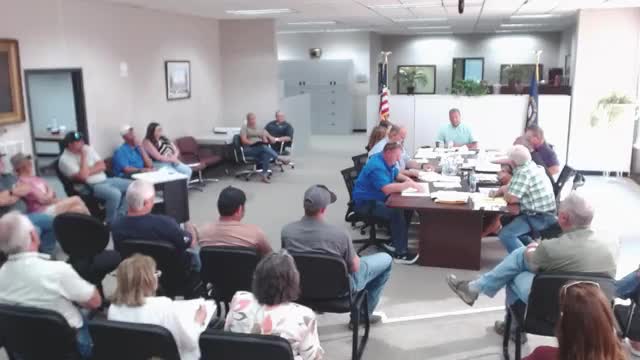Community Outcry Over Solar Farm Setback Regulations
August 05, 2024 | Ballard County, Kentucky
This article was created by AI summarizing key points discussed. AI makes mistakes, so for full details and context, please refer to the video of the full meeting. Please report any errors so we can fix them. Report an error »

In a recent government meeting, officials addressed community concerns regarding transparency and the regulations surrounding solar energy projects in Ballard County. The discussion highlighted a perceived lack of communication between the county government and residents, particularly regarding the setbacks for solar farms, which some residents believe are insufficient to protect their property values and quality of life.
Officials acknowledged community frustrations, apologizing for any misunderstandings about the county's transparency efforts. They emphasized that all meeting minutes and budgets are publicly available online, although some residents claimed they were unaware of these resources until recently.
A significant point of contention arose over the cap on the number of acres designated for solar farms, set at 3,000 acres by a recent court resolution. Residents expressed concerns about the potential influx of solar companies and the impact on their neighborhoods. The county clarified that while new companies could not enter if existing ones sold their leases, any changes to the ordinance would require legal review.
The conversation also touched on the state's role in setting regulations, with officials explaining that the county had initially adopted more lenient setbacks than those established by state law in 2015. This discrepancy has led to calls for revisiting the regulations to ensure they align with community interests. Residents voiced their desire for setbacks to be increased to 1,000 feet, reflecting concerns about the visual and environmental impacts of solar installations.
As the meeting progressed, officials acknowledged procedural errors in the decision-making process and expressed a willingness to amend the regulations. They emphasized the importance of balancing property rights with community concerns, reiterating that they do not wish to restrict landowners from utilizing their property for solar energy.
The meeting concluded with a commitment to further discussions, including consultations with legal counsel, to explore potential amendments to the current regulations. Residents left the meeting hopeful for a resolution that respects both their property rights and the county's need for economic development through renewable energy projects.
Officials acknowledged community frustrations, apologizing for any misunderstandings about the county's transparency efforts. They emphasized that all meeting minutes and budgets are publicly available online, although some residents claimed they were unaware of these resources until recently.
A significant point of contention arose over the cap on the number of acres designated for solar farms, set at 3,000 acres by a recent court resolution. Residents expressed concerns about the potential influx of solar companies and the impact on their neighborhoods. The county clarified that while new companies could not enter if existing ones sold their leases, any changes to the ordinance would require legal review.
The conversation also touched on the state's role in setting regulations, with officials explaining that the county had initially adopted more lenient setbacks than those established by state law in 2015. This discrepancy has led to calls for revisiting the regulations to ensure they align with community interests. Residents voiced their desire for setbacks to be increased to 1,000 feet, reflecting concerns about the visual and environmental impacts of solar installations.
As the meeting progressed, officials acknowledged procedural errors in the decision-making process and expressed a willingness to amend the regulations. They emphasized the importance of balancing property rights with community concerns, reiterating that they do not wish to restrict landowners from utilizing their property for solar energy.
The meeting concluded with a commitment to further discussions, including consultations with legal counsel, to explore potential amendments to the current regulations. Residents left the meeting hopeful for a resolution that respects both their property rights and the county's need for economic development through renewable energy projects.
Don't Miss a Word: See the Full Meeting!
Go beyond summaries. Unlock every video, transcript, and key insight with a Founder Membership.
✓
Get instant access to full meeting videos
✓
Search and clip any phrase from complete transcripts
✓
Receive AI-powered summaries & custom alerts
✓
Enjoy lifetime, unrestricted access to government data
30-day money-back guarantee

